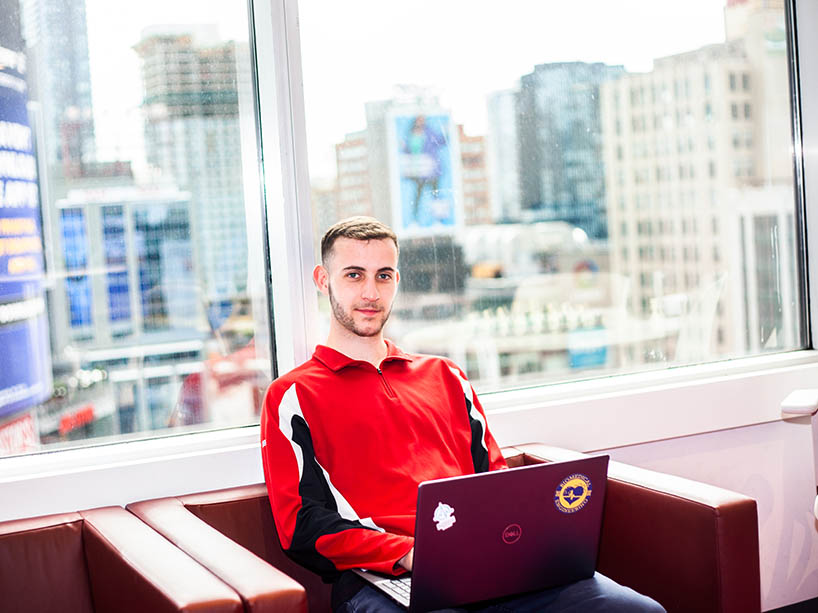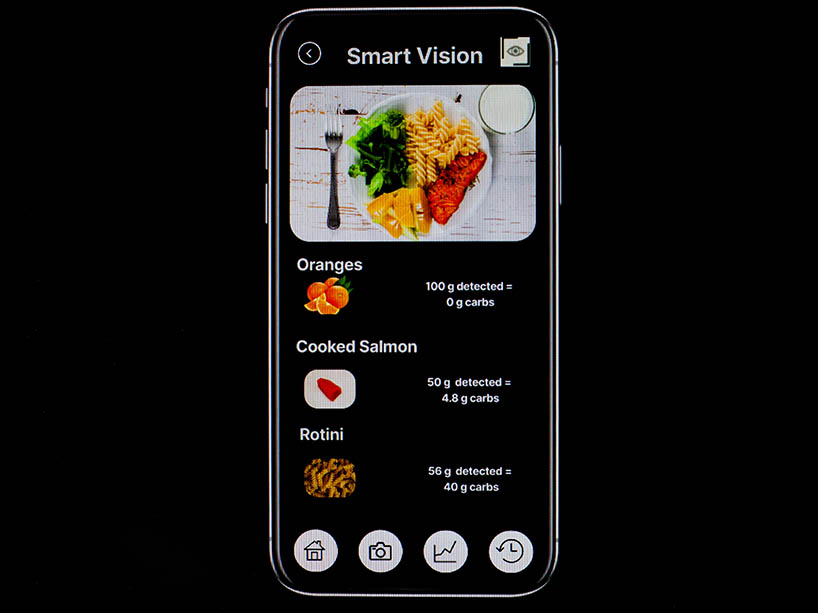Students’ app to use artificial intelligence to manage diabetes

Liam Bell is developing a new app with fellow TMU engineering students and friends Osama Muhammad (mechanical) and Muhammad Khan (electrical). The three co-founders are all graduating from TMU this month.
For the more than three million Canadians diagnosed with diabetes, mealtime typically requires careful consideration about what, when and how much to eat. The calculus is key to regulating blood sugar levels and avoiding health complications, but it’s an imprecise approach that can be tedious.
A smarter way to make these food choices is now on the horizon, thanks to an artificial intelligence innovation by Toronto Metropolitan University student Liam Bell. The biomedical engineering undergraduate is co-creating Glucose Vision Inc. (external link) , a first-of-its-kind smartphone application that evaluates your meal serving in real-time, makes portion recommendations and determines how much insulin you require.
“The goal is, How can we take out the guessing game of how much am I eating, and how much insulin I should secrete, and really automate this process through machine learning?” says Bell, who is developing the app with fellow TMU engineering students and friends Osama Muhammad (mechanical) and Muhammad Khan (electrical). The three co-founders are all graduating from TMU this month.
Here’s how Glucose Vision will work: you take a photo of what you want to eat, and the app determines the quantity of carbohydrates, the sugar-based nutrients your body breaks down into glucose. This process works via image recognition technology: the app has been fed thousands of photos of labelled foods, which allows its algorithm to identify and assess carbohydrate quantities.
The app will initially be geared to those with type 1 diabetes who use a continuous glucose monitor. The app will connect to the monitor so that it has knowledge of your overall blood sugar activity. It will then automatically determine how many carbs you can safely consume at your next snack or meal, and how much insulin you may need to take, in order to maintain a healthy and stable blood sugar level. The health risks of uncontrolled glucose levels are serious and include kidney failure, blindness, nerve damage, stroke and heart attack.
A winning business case
The concept for Glucose Vision emerged at the 2019 Frontiers of Healthcare Conference at St. Michael’s Hospital. There, Bell, Muhammad, and Khan participated in a case competition that required creating a self-triage tool for disease management. They chose to focus on diabetes, as they all had family members and friends living with the disease. Their app won the first place $1,000 award, and was accepted into TMU’s IBZ (Innovation Boost Zone) for early-stage technology startups.
That success was the first of several: since then, Glucose Vision scored first place in all three stages of TMU’s Norman Esch Engineering Innovation and Entrepreneurship Awards, resulting in $38,000 in prize money.

Take a photo of what you want to eat, and the app will determine the quantity of carbohydrates, the sugar-based nutrients your body breaks down into glucose. Photo by Sarah Palmer
As well, the founders recently wrapped up an 11-month funded computer vision research internship at Mitacs, a non-profit organization that works to catalyze innovation in Canada. The experience allowed for honing their deep learning algorithm for conducting real-time food analysis and diabetes self-monitoring. Glucose Vision is currently being nurtured further at TMU’s Biomedical Zone, as the group works to create a minimum viable product that it can bring to market.
“They have an excellent idea,” says Ryan Wilock, a startup advisor for TMU’s zone learning, a network of incubators that supports students with training and mentorship to actualize their enterprises. “I believe these three are not just entrepreneurs, but people who will be difference makers in our community.”
To gather vital clinical input on their invention, the trio has worked with the Biomedical Zone to build connections with local dietitians, endocrinologists and other health professionals affiliated with the Unity Health Toronto network of hospitals. The Biomedical Zone, Canada's first hospital-embedded startup incubator, specializes in integrated clinical engagement and business development to accelerate startup growth.
They have also hired two TMU students for four-month apprentice terms to support their efforts, a social media manager, and a front-end web developer to enhance the app’s design and navigation. Down the road, they plan to expand the app’s functionality to also suit individuals with type 2 and gestational diabetes.
With diabetes being a top 10 cause of death in Canada that costs $30 billion a year to treat, Bell and his partners see Glucose Vision as a way to improve quality of life for affected individuals while alleviating pressure on health-care systems.
“We hope this app can help reduce the risk of long-term diseases that can come into play and reduce the burden on our hospitals,” Bell says, “so that people with diabetes can live as much of a normal life as possible.”